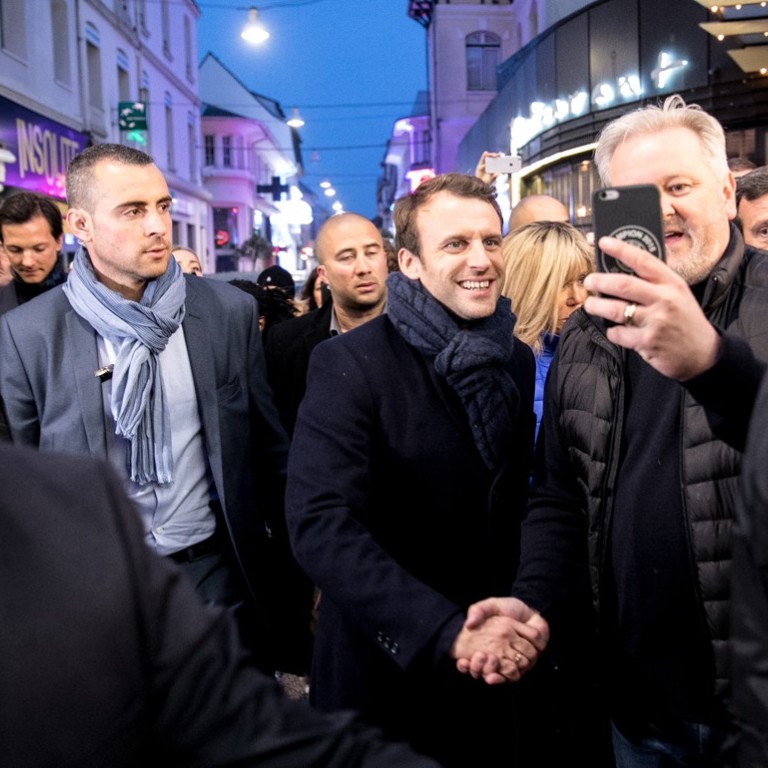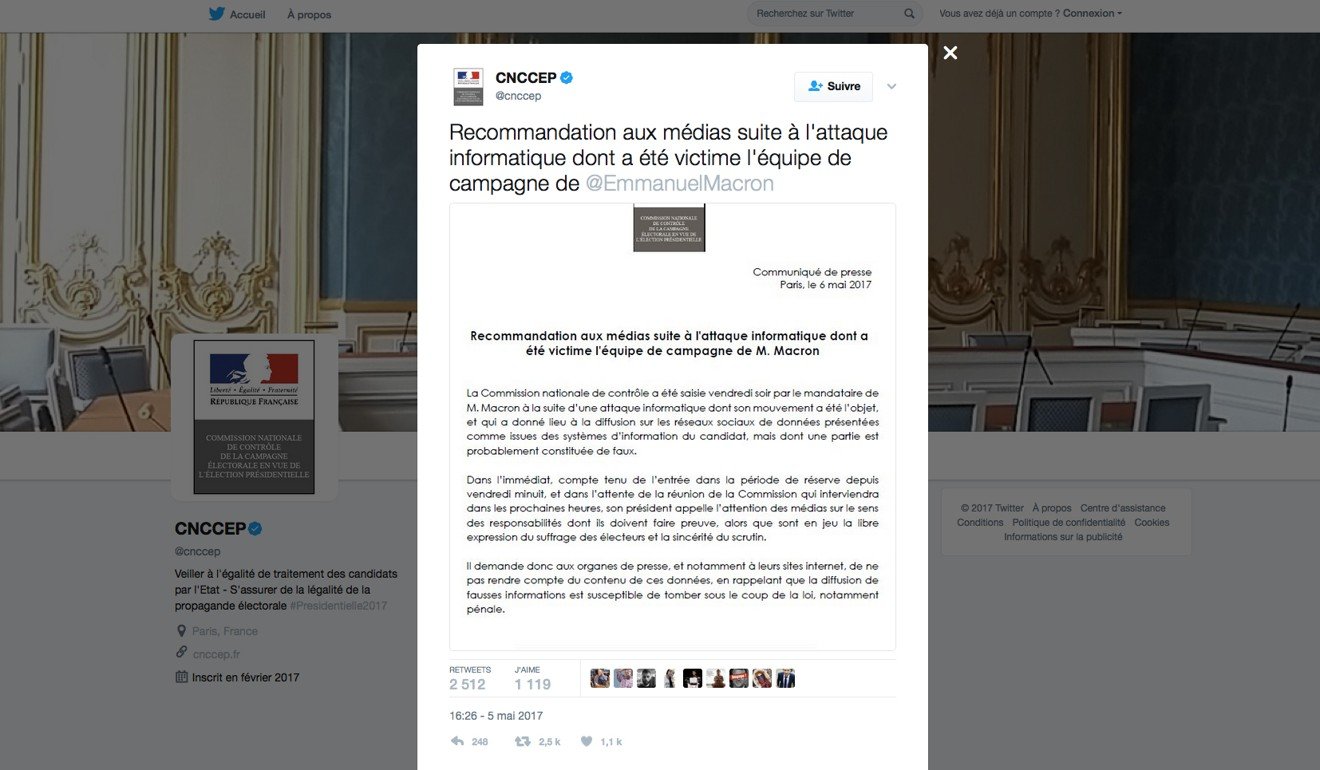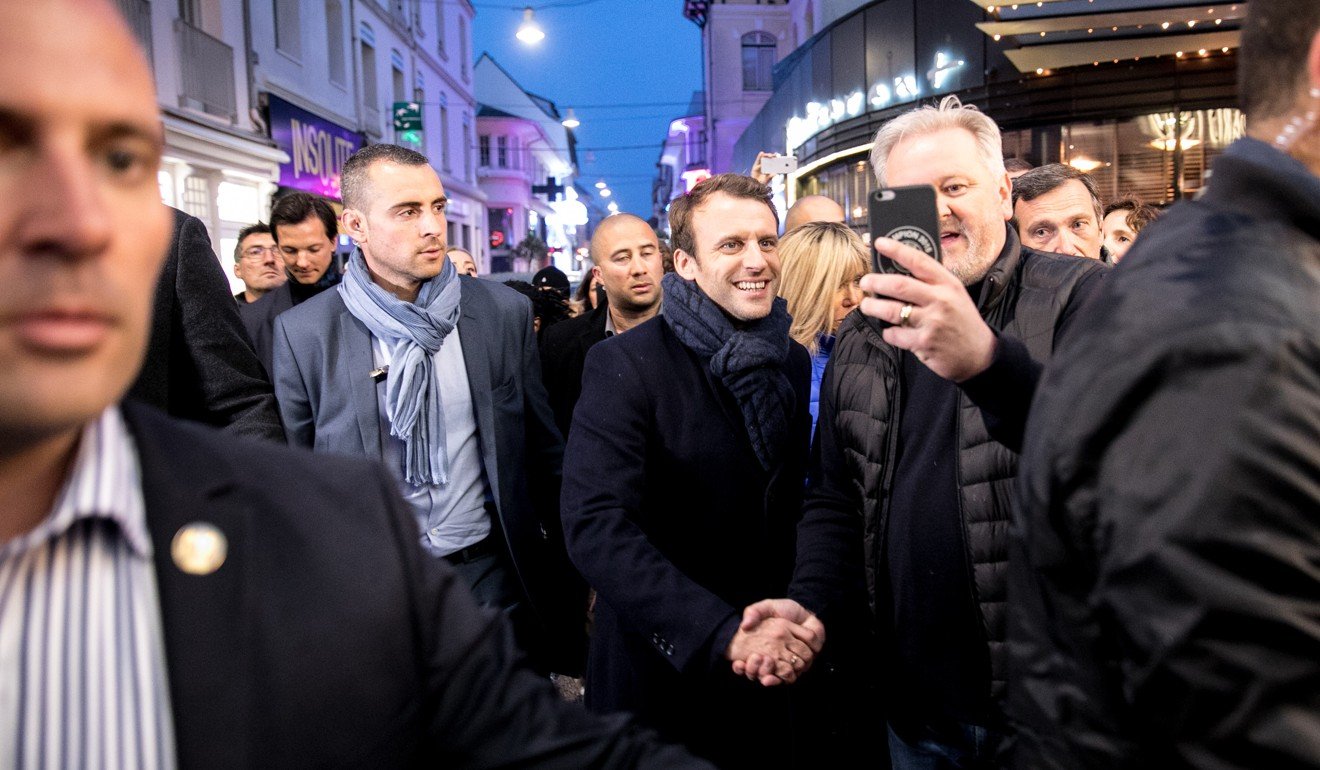
‘People are not naive’: in France, an election hack falls flat, as voters shrug and media maintains silence
It was an 11th-hour surprise that seemed to offer final proof of how closely this weekend’s critical French election mirrored the high-stakes American contest last fall.
And yet the reaction couldn’t have been more different.
A centrist candidate who embraced globalisation was facing off against a populist, anti-immigrant firebrand who spoke warmly of Russia. Terrorism was at the forefront of the discussion. Voter distrust ran high.

“Intervening in the last hour of the official campaign, this operation is obviously a democratic destabilisation, as has already been seen in the United States during the last presidential campaign,” Macron’s staff said Friday night, minutes before the start of a strict curfew on campaigning, which made further public response off-limits.
The announcement was all too familiar for those who had watched as embarrassing internal communications from Hillary Clinton’s presidential campaign seeped onto the Internet last summer, much to the delight of her opponent, Donald Trump, who won an upset victory in November. The correspondence, which included discussion of the Democrat’s private email server and the assessment of her own aides that her instincts could be “terrible,” became one of the tools Republicans used to disparage Clinton.
Hiding information is not the same thing as refusing to be manipulated by those who diffuse the information
In France, few people even knew what was in the Macron team’s emails. The blanket ban on campaigning meant that far-right candidate Marine Le Pen and her National Front couldn’t mention them, though a deputy leader of her party did tweet early Saturday, “Will #Macronleaks teach us something that investigative journalism has deliberately killed?”
The answer was no. Most media chose to heed a request from the France’s electoral commission not to reproduce the emails’ contents. Le Monde, the major French daily, said in a statement that it had seen part of the documents but would not publish their details before the election, due to the volume of the dump and because the release had “the clear goal of harming the validity of the ballot.”
The paper’s editor, Jerome Fénoglio, said in an interview that the documents would have been leaked earlier if they had contained damaging information. As it was, he said, “the best hope was to make noise.”
He said the response of the media in France carried lessons for journalists elsewhere, including those in the United States who rushed to reproduce pre-election leaks without thoroughly investigating their origins.

Voters, meanwhile, mostly waved away the news, saying their decision came down to more consequential matters. And they backed Macron by a huge margin, 66 to 34 per cent, handing him a decisive victory over Le Pen.
“The release is not important to me,” said Michèle Monnery, 74, after casting her vote for Macron in Laon, a small city in the north. “What matters to me is stopping Le Pen.”
If anything, the hack and leak appeared as a desperate manoeuvre...People are not naive
Analysts immediately presumed the intrusion was designed to prop up Le Pen in the final stretch of a bruising campaign that had the power to dictate the future of an integrated Europe. They refrained, initially, from assigning blame for the hack, although experts concluded that its propagation began in the United States with a cluster of Twitter accounts run by members of a far-right movement whose aim is a whites-only state.
Now multiple research firms have linked the hacks to those that compromised the Democratic National Committee last year - links suggesting that Russian intelligence services accused of interfering in the American election may have sought to do the same in France. The finding was made last month, after the first round of voting, by Trend Micro, a Tokyo-based cybersecurity firm that fingered Russian hackers, known variously as Pawn Storm, APT28 and Fancy Bear. Recent analysis by Flashpoint Intel in New York came to the same conclusion, namely that the French hack “appears to be linked to the Russian state-sponsored campaign by APT28.”
Macron’s campaign said the documents included routine emails and other internal communications interspersed with fake materials. A statement Monday from Mounir Mahjoubi, Macron’s digital director, said his campaign had taken numerous cybersecurity precautions, notably by flooding phishing attempts with fake passwords. Mahjoubi said the campaign has faced several attempts each week to access its accounts.
The foresight to plant false information represents a savvy strategy on the part of the campaign, cyber-experts said.
“It’s a good practice to do that more and more,” said Alexander Klimburg, an expert on cyberwarfare at The Hague Centre for Security Studies who has been in regular contact with French civil service officers. “For me the question would be more if they were advised by the government to take certain steps.”
Frederick Douzet, a professor of cybersecurity and geopolitics at Paris 8 University, said the ordeal - addressed highly professionally by Macron’s campaign - did no visible damage to his candidacy.
“If anything, the hack and leak appeared as a desperate manoeuvre,” she said. Precisely because of the example of the American election, “people are aware that fake news is around, fake documents could be mixed with real documents and that some people are trying to influence the election,” she said. “People are not naive.”

